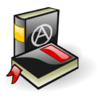Portal:Anarchism
|
Anarchism (from Greek ἀν (without) + ἄρχειν (to rule) + ισμός (from stem -ιζειν), "without archons", "without rulers") is often defined as a political philosophy which holds the state to be undesirable, unnecessary, or harmful. Some anarchists have argued that while anti-statism is central, it is inadequate to define anarchism. This traditional notion of anarchism entails opposition to all authority or hierarchical organization in the conduct of human relations, including, but not limited to, the state system. In particular, it includes opposition to religion and capital, resulting in the famous anarchist proclamations "Property is theft!" and "No gods, no masters!" Proponents of anarchism, known as "anarchists", advocate stateless societies based on non-hierarchical free associations.
Anarchism as a mass social movement has regularly endured fluctuations in popularity. The central tendency of anarchism as a social movement has been represented by anarcho-communism and anarcho-syndicalism, with individualist anarchism being primarily a literary phenomenon (which nevertheless did have an impact on the bigger currents, including the participation of individualists in large anarchist organizations). Many anarchists oppose all forms of aggression, supporting self-defense or non-violence (anarcho-pacifism), while others have supported the use of some coercive measures, including violent revolution and propaganda of the deed, on the path to an anarchist society. Selected articleThe Manifesto of the Sixteen (French: Manifeste des seize), or Proclamation of the Sixteen, was a document drafted in 1916 by anarchists Peter Kropotkin (pictured) and Jean Grave, which advocated an Allied victory over Germany and the Central Powers during World War I. It was the position of Kropotkin and the other signatories that the forces of German imperialism constituted a major threat to the working class of the world and must be defeated. The document is named after the original number of signatories, but incorrectly counts sixteen names, rather than the proper fifteen, due to a misreading of the text. It was first published in La Bataille Syndicaliste. The position of the manifesto was in stark contrast to that of most anarchists of the day, many of whom denounced the signatories and their sympathizers, and accused them of betraying anarchist principles. (read more...)Selected imageA protester in the anarchist community of Freetown Christiania, Denmark hurls a molotov cocktail in the direction of a police van in May 2007. Violent resistance is a form of direct action opposed by pacifist anarchists but espoused by illegalists and insurrectionary anarchists. Did you know?
Anniversaries for February 9
Relevant listsCategoriesSelected quoteAnarchism topics
Related Wikimedia
|




